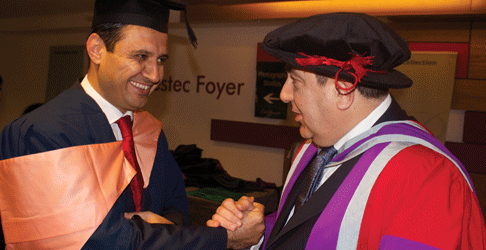Why should London not be at the heart of Russian intelligence? The British spies are doing quite well their part in stepping up revolutions throughout their former empire. Furthermore, Russian oligarchs are welcomed with a passport to the empire just as long as the stash of millions is distributed in the City buying real esate housing or a castle as a home. Kensington anyone?
 « click for bio of Mifsud [cached] »
« click for bio of Mifsud [cached] »
LAD's professor Joseph Mifsud congratulates a student
The London Academy Of Diplomacy
Barry Tomalin says this institution in the heart of the capital is revolutionising diplomatic education
What stresses diplomatic staff out most? Is it the everyday problems of diplomatic life and fitting everything into a crowded schedule? Is it crisis management when political issues arise? Or is it the endless process of producing reports, preparing press releases and making speeches at dinners and conferences? No, that’s all par for the course. It’s knowing how to do it in English that causes a lot of stress, even for fluent speakers. And it’s not grammar or vocabulary that is the problem. It is what linguists call the socio-linguistic appropriacy of communication, and no matter how proficient you are in `diplomat speak’ in your own language it is always a challenge to do it successfully in the international medium of communication that is English.
Helping diplomats communicate successfully is just one of the innovations brought in by the London Academy of Diplomacy (LAD). Located in the heart of the City of London and with a cohort of some 150 international serving diplomats, members of NGOs and independent students training to work in the international field, LAD, as it is popularly known globally, is one of the UK’s foremost education and training institutions for diplomats. Its courses for diplomatic discourse, international communication and strategies for handling media and international liaison are lauded as effective training programmes to help diplomats master essential communication skills.
These are modules on the three MSc (Master of Science) pathways offered by LAD to help improve their qualifications, experience and knowledge of key areas that impact diplomatic lives.
Special to LAD is the tutorial system. Each student is allocated a personal tutor who helps them throughout their studies. Many form a strong bond as, given the rigours of diplomatic life, tutorials may take place in the embassy or high commission as well as in college. Indeed many students refer with pleasure to the ‘family atmosphere’ that prevails in the Academy.
…
What is it that makes LAD so popular? A recent survey of students has revealed some interesting insights. Foremost was the mix of academic excellence and professionalism, manifested in the fact that all the academic faculty combine teaching with consultancy and advice to diplomatic and professional bodies such as the IMO, NATO, the UN and the EU, as well as training and consultancy in NGOs and the corporate sector. This combination of academic knowledge and the way it is applied in practice is immensely attractive to prospective students because it is directly linked to one key factor: employability and currency of the final degree.
Quite comical … British former spy Chris Steele going to Moscow for “intelligence” on a paycheck by Hillary’s DNC. Why no extra support from the FBI in September 2016? Really missed an opportunity …

I don’t why you’re doing it, but it hasn’t gone unnoticed.
Olga Mifsud
Office Manager at Admin Genie Ltd
Malta Hospitality
PS Not connecting dots, would need to do some research 😉
Stranger things happen on Malta recently …
○ Death of a Blogger Casts Shadow Over Murky Malta
○ Malta: The Russian Connection [cached]
○ Russian billionaire’s fast loan empire uses Malta tax avoidance inside EU
○ Russians refute allegations of meddling in Maltese election
See today’s Washington Monthly story – The Russians’ Sloppy Papadopoulos Spycraft .